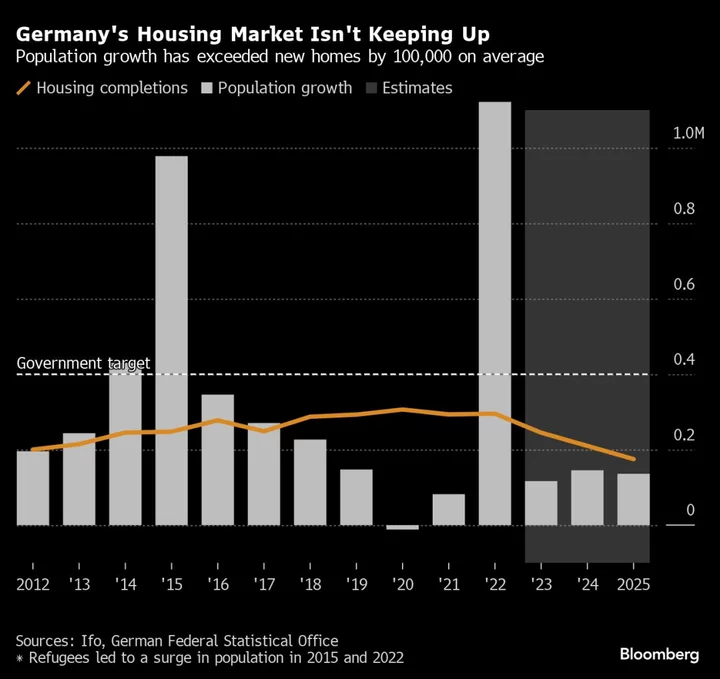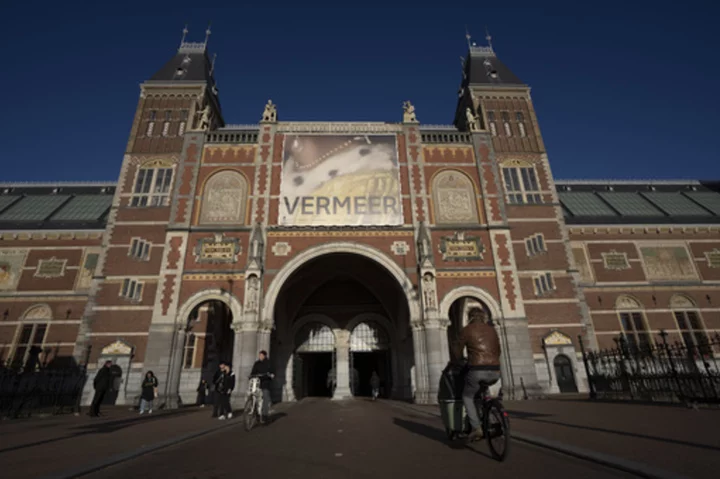In a leafy neighborhood in Dusseldorf, Milena and Manuel David planned to break ground this summer on a new home, a milestone that was going to get them out of a cramped apartment where they share a bedroom with their two kids.
But during the 16-month wait for a permit, mortgage rates had tripled and their building costs rose by €85,000 ($90,000). The couple crunched the numbers again before facing the fact that their dream of building their own home had collapsed as part of Europe’s worst construction crisis in decades.
Similar struggles are playing out across much of the continent. Residential building has tumbled as costs soar, while sluggish bureaucracies and increasingly stringent energy-efficiency regulations add to the headwinds. With housing already tight, the situation threatens to weigh on growth and further stoke political tensions as shortages squeeze more and more voters.
“I spent so many nights lying awake,” said Milena, a 37-year-old teacher, overlooking the overgrown shrubs and weeds where her kids were supposed to be playing. “What makes me angry is that we were so close.”
The Davids were prime home building candidates. The family has two incomes, stable jobs in the public sector, and most importantly, they didn’t have to pay for their building lot, which was given to them by Manuel’s parents. Their struggles show just how broken Europe’s housing market is.
“If we’re given this massive leg-up and we’re still struggling, how are others supposed to make it at all,” said Manuel, a 35-year-old project manager at a non-profit organization.
The hardest-hit countries are among the wealthiest. New building permits in Germany have fallen more than 27% in the first half. Permits in France are down 28% through July, and UK home building is expected to drop more than 25% this year. Sweden is suffering its worst slump since a crisis in the 1990s, with building rates less than a third of what’s deemed necessary to keep up with demand.
The downturn is affecting single-family homes — like the one the Davids were planning — as well as large housing projects. Vonovia SE, Germany’s biggest landlord, this year shelved all new construction indefinitely. And in Sweden, a key project to make battery cells for cars and reduce the region’s dependence on supply from China, risks struggling to attract enough workers because of a lack of housing.
Read More: Nordic Construction Crunch Worsens as Unsold Units Pile Up
The situation means governments are falling short on promises to voters. Sweden has a constitutional pledge to provide affordable housing, but supply of rental apartments hasn’t kept up with demand for decades, driving up home prices and forcing people to live in black-market sublets. In the UK, home building has consistently missed a target of 300,000 houses per year set by the ruling Conservative government in 2019.
In Germany, affordable housing was one of the key commitments made by Chancellor Olaf Scholz’s ruling coalition when it took power in 2021, but economists estimate that the government won’t reach its goal of adding 400,000 new homes annually until 2026 at the earliest.
“Making sure citizens have a place to live is one of the state’s most essential duties,” said Kolja Müller, co-head of the Scholz’s Social Democratic party in Frankfurt. “It’s clearly failing.”
The squeeze on housing risks widening social divides by forcing people to shell out more of their income for accommodation. Attitudes toward migrants could also further deteriorate as they’re increasingly seen as rivals for scarce living space. In Lörrach — a town in southern Germany — several dozen tenants were forced to move apartments earlier this year to make way for refugees.
“If we can’t solve the housing crisis, it’ll be a real threat for our democracy,” said Müller, who attributes the rise of the far-right Alternative for Germany — the second-strongest party in polls — in part to tensions over housing.
Trends aren’t dire everywhere. In Portugal and Spain, housing starts are well above levels in 2015, when the aftermath of the debt crisis all but froze building in those markets. But there are still severe shortages, showing how difficult the problem is to fix, and initiatives to lure investors — like Portugal’s golden visa program — have caused home prices to surge.
Read More: Runaway Property Costs Push Portugal to End Golden Era of Visas
The struggles to build enough affordable homes ultimately stems from poor government policy. Housing falls somewhere between a market-driven asset and a regulated public good. That combination bogs down investment while subjecting the sector to volatility, and the current upheaval in financing and construction costs often makes building unprofitable, except for luxury homes.
Governments used to take a more active role in housing. A significant share of Sweden’s existing homes were built as part of a state-led initiative to add a million dwellings between 1965 and 1974. In Germany, cities like Berlin built massive residential estates for workers migrating to urban centers after the end of World War I.
But that’s changed. In Germany, the shift to relying on the private sector was intensified by reunification, which squeezed public coffers and prompted many cities to sell real estate holdings. In the late 1980s, Germany still had around 4 million social housing units, but that number has slumped to little more than 1 million in 2020. It’s a similar situation in the UK, where council flats were sold off to tenants in the 1980s.
“The state tends to favor the individual, rather than the community, and mostly leaves it to private owners to provide adequate housing,” said Kerstin Brückweh, a historian at the European University Viadrina Frankfurt (Oder).
In East Germany, where the far-right AfD has the strongest support, housing anxiety is particularly acute. After reunification, many lost the right to live in houses the communist regime once provided. Today, East Germans are still less likely to own property than their West German peers.
In Skelleftea in northern Sweden, that paradigm risks slowing Northvolt AB’s plans to ramp up its first battery-cell factory. The company is hiring more than 100 people a month, but the construction slump is making it nearly impossible for the town of 36,000 to keep pace.
“We could hit a significant bump in the road,” said Patrik Larsen, head of land and development at the municipal administration. “This is a huge challenge.”
The construction crash has led to calls for incentives and industry support, but governments have limited appetite for additional spending after the Covid pandemic and amid efforts to rein in inflation. The result is a wave of company failures and restructuring cuts that risk reducing long-term building capacity.
In the UK, about 45,000 residential property builders have shuttered over the past five years. In Sweden, 1,145 companies in the construction industry filed for bankruptcy in the first 10 months of this year, an increase of 35% from 2022, according to data from Creditsafe.
The fate of Frankfurt’s old police headquarters is emblematic of the strains of a system that leaves housing supply in private hands. The 15 hectare site in the financial hub’s downtown was abandoned for more than 15 years before Gerchgroup acquired it and pledged to restore the grand 1914 structure and build more than 440 partially subsidized apartments.
But in August, the developer filed for insolvency, leaving a hole in the city center, where homes are needed. In the five years that Gerch owned the landmark site, not a single excavator went to work.
Politicians are gingerly weighing in. Britain’s Labour Party has pledged a package of reforms to accelerate the country’s sluggish planning system and to build 1.5 million homes over the next term of Parliament. Portugal’s government aims to increase the amount of real estate available for residential use and simplify licensing procedures. Germany pledged to simplify building rules and boost public investment, but the tepid action isn’t expected to offer much relief.
“These drip-feed changes create total uncertainty among builders,” said Wolfgang Schubert-Raab, president of the building sector’s ZDB lobby group. Instead of starting projects immediately, they’ll wait for even better subsidies next year, “when the situation will look even bleaker,” he said.
For the Davids, the family hopes that if they change the floor plans, scrap the basement and get more state funding, they might still be able to start construction, but they aren’t getting carried away.
“I honestly kind of stopped being optimistic that this will work out until we can actually start building,” said Milena.
--With assistance from Damian Shepherd, Jenny Che, Liza Tetley, Ainhoa Goyeneche, Joao Lima and Henrique Almeida.









